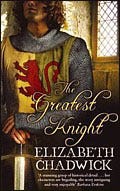The Greatest Knight is a biographical novel about a man at the center of events during the turbulent reigns of Henry II and his sons. In his own time, William Marshal captured the public imagination as rock stars do in our own, but today few people have heard of him. Hopefully, this novel can correct that.
As an impoverished young knight, William Marshal followed the tournament circuit in France, where it was customary to capture as many other knights as possible in the wide-ranging melees and demand ransom money for their release. Marshal was a natural at it - he was said to have fought in 500 tournaments without losing once - and he didn't stay impoverished for long. More remarkably, he served different members of the contentious family of Henry II and Eleanor of Aquitaine in one or another high capacity through times when the infighting among them broke into open warfare, but he never permanently lost favor with any of them.
We meet Marshal during his youth as a squire in an uncle's household and follow him for almost three decades, ending with the crisis of Prince John's attempt to seize the throne after King Richard disappears during his return voyage from the Third Crusade. Chadwick's prose and narrative style are competent and straightforward, if not particularly elegant. What makes The Greatest Knight exceptional is the consistently pitch-perfect way in which its medieval characters think, feel and behave. Not for a moment does an anachronistic thought or attitude slip through any of their minds. The texture and psychological depth of their portrayal gains the reader's sympathy and understanding even as they make decisions most of us would find reprehensible today.
And yet William Marshal offers an example we might do well, even now, to emulate. "I do value loyalty," King Richard tells him, "but I value your integrity more. . . . You will do what is right and just." (2005; Sourcebooks edition 2009, 549 pages including an Author's Note separating fact from fiction)




